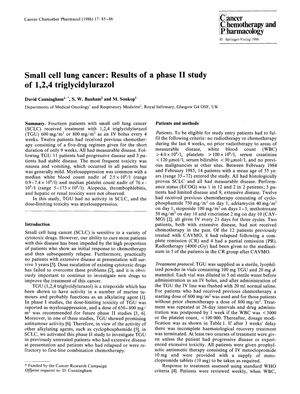Small Cell Lung Cancer: Results of a Phase II Study of 1,2,4-Triglycidylurazol
May 1986
in “
Cancer Chemotherapy and Pharmacology
”

TLDR The drug TGU was ineffective against small cell lung cancer and caused significant bone marrow suppression.
In a phase II study conducted between February 1984 and February 1985, 14 patients with small cell lung cancer (SCLC) were treated with 1,2,4 triglycidylurazol (TGU) at doses of 600 mg/m² or 800 mg/m² as an intravenous bolus every 4 weeks. Twelve of these patients had previously undergone chemotherapy. The results showed that TGU had no significant antitumor activity in this patient group, with 11 patients experiencing progressive disease and 3 patients having stable disease. The most common side effect was mild nausea and vomiting, which all patients experienced. Myelosuppression was the dose-limiting toxicity, with a median white blood count nadir of 2.5 × 10⁹/L and a median platelet count nadir of 76 × 10⁹/L. No patients developed alopecia, and those with pre-existing alopecia reported hair regrowth. There was no observed renal or hepatic toxicity or thrombophlebitis. The study concluded that TGU, when administered at a dose of 600 mg/m², had no activity against SCLC and was associated with significant myelosuppression.






